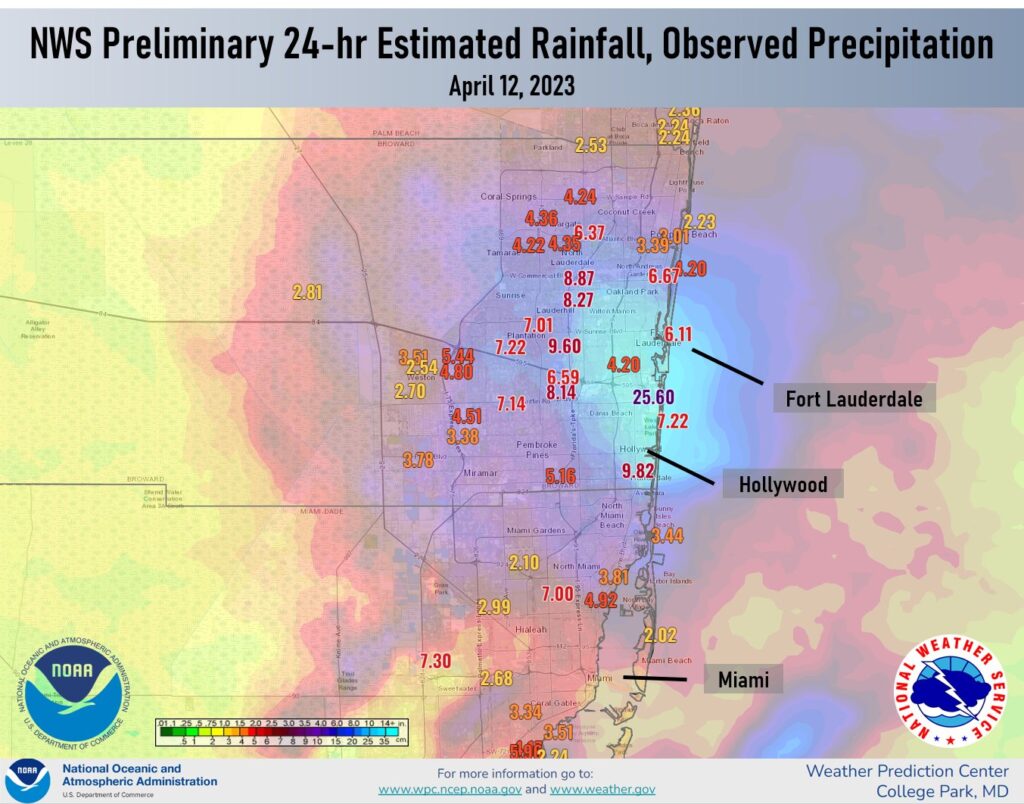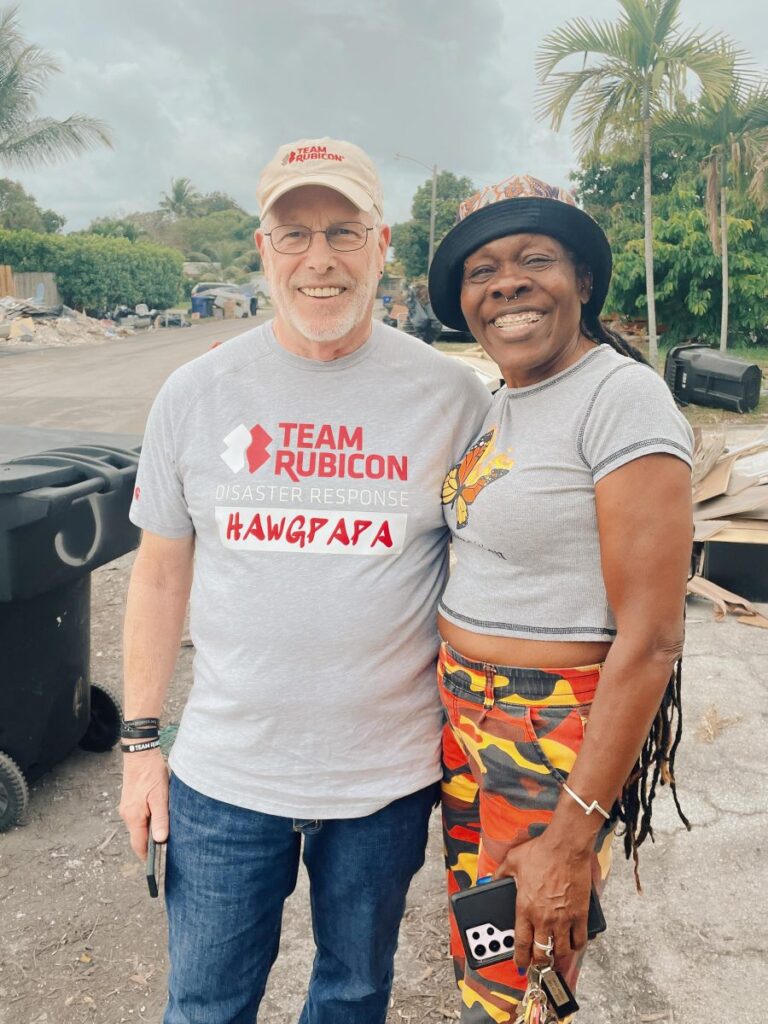Operation Little Venice, assisting those in need after an epic flood, was unlike any other operation I have participated in.
The operation took place in southern Florida after showers that began on April 9, 2023, were followed by three days of downpours and strong storm cells in Broward County. Sure, it’s rainy season in south Florida: it rains every day in rainy season. This is a tropical zone, not California or the areas where prior rain matters. But the rain on April 12 was different. It was historic.

The flooding and strong winds resulted in airport closures, road closures, power and internet outages, and residential flooding. It was so severe that a small neighborhood section just north of the Fort Lauderdale–Hollywood International Airport saw water rise as high as 4 feet on April 12. When more than 25 inches of rain fell over the course of 10 hours, the whole city flooded, with one area—Edgewood—absolutely devastated.
Sunday, April 23, proved to be a test of endurance for my partner and I, who were tasked with conducting windshield assessments—driving around hard-hit areas to see where our muck-out teams might be able to help—and also site surveys. Following a slow rollout from base, we made a team decision to canvas the most affected neighborhood and look for homes where no residents or other nongovernmental organizations were conducting work. As we identified a home we believed to be in need of assistance, we would knock on the door or approach prospective homeowners and attempt to secure aid for the residents who might be in need of the services Team Rubicon offers at no cost to homeowners. What we kept discovering, however, was a community that had been working vigorously on evenings and weekends in order to bring about a semblance of normalcy to their lives.
After a few hours without luck, we decided to go to a neutral location and rethink our strategy in order to fulfill our obligation to the survivors of the epic flood. We came to the conclusion that we would approach contractors and various homeowners we did see working in the area to identify people in the area who were in need of assistance.
While canvassing our area of operations, we were approached by Andrew, a landscaping contractor, who had already sent text messages to survivors he assumed might be in need of help.
As we spoke to Andrew, he spotted William, a middle-aged gentleman who moved with a sense of purpose and who was weighed down with debris that he was staging in front of a home.
While Andrew returned to his work at hand, Willam dropped what he was doing to talk to us. William explained that he had been conducting muck-out operations on his own and at no charge to the homeowner, Ms. Mitchell, who was letting him stay with her while he saved up for a place of his own. He let us know, in no uncertain terms, that he would continue to help Ms. Mitchell until the work required to repair the home was completed, and Ms. Mitchell could rest easy.
After explaining who we were and who we represented, my partner and I asked William if there was anything Team Rubicon could help with. William was ecstatic and showed us where we could park.
Upon exiting the vehicle, I noticed a middle-aged woman dressed all in black, her clothes torn and tattered, not from neglect but from working every day since the storm nearly two weeks prior. She seemed to be preoccupied and, at the same time, reluctant to deal with anyone since she had been promised everything—by some fraudulent contractors and also by other various nongovernmental organizations—and had received nothing. Perhaps that was because the whip-smart Ms. Mitchell had refused to turn over her money or personal information without receiving so much as a business card.
After explaining who we were and who we represented, Ms. Mitchell began to exude a more positive, although still guarded, approach. Eventually, she granted us the right of entry to at least assess the home.
As we entered, Ms. Mitchell introduced us to her best friend, Donna Scott. Later, we would learn the two attended school together but had lost touch when Ms. Scott embarked upon a military career while Ms. Mitchell went on to earn her Ph.D. in Philosophy & Pastoral Clinical Psychology. Now retired, the two had reconnected, much to the joy of both.
As we began to assess the home, Dr. Mitchell and William explained what they had done, both inside and out. During our walkthrough, we noticed mold spores nearly 40 inches up the wallboard and within the baseboard and casement molding. As we conveyed our concerns to Dr. Mitchell, she became hesitant to do all of the work that my partner and I felt was needed. William reassured her, and after speaking with Command and General staff, I was able to inform Dr. Mitchell we would have a crew at her home in the morning.
I was of the opinion that a good muck-out crew would be able to finish the work Dr. Mitchell was permitting in one day. However, as her confidence in Team Rubicon grew, Dr. Mitchell allowed us to do more work within her home.
The next day I was informed by the Strike Team Leader that we would not be able to finish the residence in one day due to add-ons. So, I decided to go into the backyard where she was working and explain the situation. The first thing she said to me was, “I have been a cowboy riding on a horse backwards. I prayed and God brought me 12 angels.”
Then, as Greyshirts worked on her home, Dr. Mitchell took me to her neighbor’s house. A Vietnam veteran and Cobra helicopter crew chief, David Quinn had lived in this home—which his uncle had built—since he was 12 years old and had raised his own family there. As we surveyed the home, it became evident Mr. Quinn would need a muck out and that we’d need to rip out drywall up to 48 inches as well.

Immediately after leaving Mr. Quinn’s home, I was approached by William once again. He knew of a disabled woman whose son had just suffered a traumatic brain injury. It was only Monday afternoon, and already we had found three homeowners who needed Team Rubicon’s help. But to complete it all, I also knew we’d have to come together and consolidate teams.
With an evolving team of 12 personnel, we were able to complete all of our work. In just four days Greyshirts moved almost 5,000 cubic feet of disaster debris and mucked four homes, much to the surprise and gratitude of the homeowners. While much rebuilding is yet to be done for these homeowners, we found out that until the work is complete on Dr. Mitchell’s house, Ms. Scott—that Coast Guard veteran friend who retired as a Captain—would be housing Dr. Mitchell, William, and a recent immigrant to the U.S., free of charge.
To leave you with an idea of the good Team Rubicon conducts, I will leave you with a quote from Dr. Mitchell, who has checked on my well-being and expressed her love for Team Rubicon daily since demobilization: “God gave me this house to help people, and this is God’s house, and Team Rubicon, is always welcome in God’s house.”



